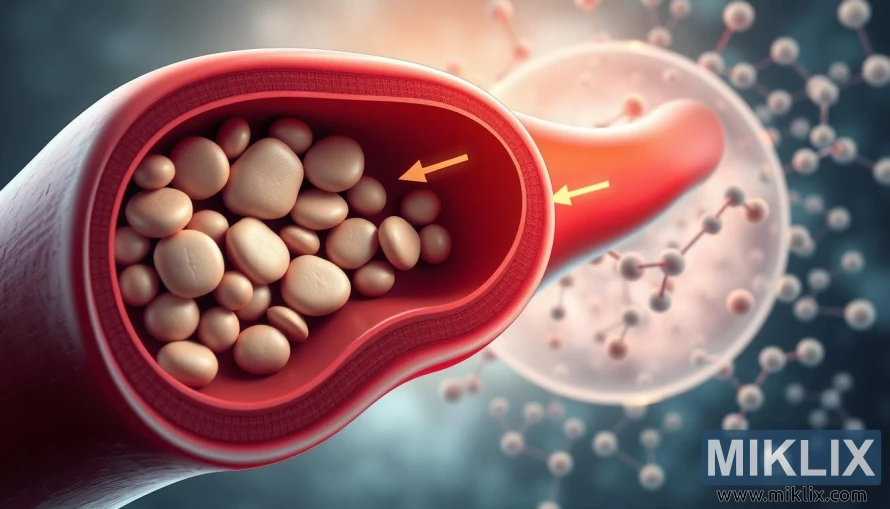From Salad Dressing to Daily Dose: Surprising Benefits of Apple Cider Vinegar Supplements
Published: June 23, 2025 at 2:14:40 PM UTC
Apple cider vinegar (ACV) supplements have gained popularity among health enthusiasts. They seek natural remedies to enhance their wellness journey. Derived from fermented apples, ACV is known for its health benefits. These include aiding in weight loss, regulating blood sugar, managing cholesterol, and improving digestive health. While research is ongoing, many individuals are embracing ACV supplements. They view it as a holistic approach to boost their overall well-being.

Key Takeaways
- Apple cider vinegar supplements are known for their health benefits.
- ACV is a popular natural remedy with numerous wellness applications.
- Supplementing with ACV may assist in weight loss efforts.
- Research suggests that apple cider vinegar can help lower blood sugar levels.
- Many people use apple cider vinegar for cholesterol management.
- ACV is praised for its digestive health benefits.
What is Apple Cider Vinegar?
Apple cider vinegar is a distinct vinegar made from fermented crushed apples. This fermentation process involves yeast and sugar. It has two phases: first, sugars turn into alcohol, then alcohol transforms into acetic acid. This acid gives apple cider vinegar its tangy taste.
Commercial apple cider vinegar is often filtered and pasteurized. Yet, raw unfiltered ACV keeps "the mother." This part includes proteins, enzymes, and beneficial bacteria. It's believed to boost the vinegar's health benefits. Many prefer raw unfiltered ACV for its natural state and unaltered qualities.
How Apple Cider Vinegar Supplements are Made
Apple cider vinegar supplements, known as ACV supplements, come in forms like pills, powders, and gummies. The process to make these involves concentrating the acetic acid and other beneficial compounds from liquid apple cider vinegar. This ensures a concentrated formula that meets consumer health needs.
The dietary supplement industry, not tightly regulated by the FDA, shows quality and ingredient variations among brands. It's essential for consumers to pick health products from trusted manufacturers. These brands usually share details about their sourcing and production, ensuring their ACV supplements are safe and effective for daily use.
High in Acetic Acid
Apple cider vinegar is predominantly made up of acetic acid, accounting for about 5% of its volume. This compound is known for its distinct acidity. It plays a vital role in the vinegar's composition. Many health benefits attributed to apple cider vinegar come from acetic acid's biological properties.
Acetic acid is recognized for its effects on health, including:
- Regulating blood sugar levels
- Assisting in weight management
- Exhibiting antimicrobial properties
Despite these promising advantages, further clinical studies are required to validate the claims surrounding acetic acid and its health benefits. Understanding the source and nature of this compound provides insight into the overall effects of apple cider vinegar on well-being.

Potential Weight Loss Benefits
ACV studies reveal apple cider vinegar supplements may aid in weight loss. The acetic acid in ACV is key to appetite suppression, leading to less calorie intake. In clinical trials, those who took 1-2 tablespoons of ACV daily with a low-calorie diet lost more fat than those without ACV.
The exact reasons behind these benefits are being studied. Some believe acetic acid boosts metabolism or increases feelings of fullness. This makes it easier to stick to a calorie-controlled diet. Apple cider vinegar can help manage weight by reducing cravings.
Lowering Blood Sugar Levels
Research suggests apple cider vinegar may help lower blood sugar after meals. Studies reveal that taking this supplement with carbs can reduce blood glucose spikes. This makes apple cider vinegar a promising tool for those seeking better blood sugar management.
For those with diabetes, this effect is noteworthy. Some studies show it can enhance insulin sensitivity. This could be how apple cider vinegar aids in blood sugar regulation. Knowing the glycemic index of foods paired with it can amplify its benefits.
Apple cider vinegar should not replace diabetes medications, but it can be a valuable addition to a healthy diet. It offers a unique way to support blood sugar control and overall health for those with insulin resistance.
Cholesterol Management
Managing cholesterol levels is key to heart health. Apple cider vinegar may help in this area. Studies hint at its ability to lower total cholesterol and triglycerides. It could also boost high-density lipoprotein (HDL), or "good" cholesterol.
Cholesterol management is about balancing lipids in the blood. Understanding low-density lipoprotein (LDL), or "bad" cholesterol, is critical. High LDL levels can cause artery blockages, affecting heart health.
Research on apple cider vinegar's cholesterol effects is promising but limited. More studies are needed to grasp its full impact. A balanced diet and exercise are essential for heart health.

Boosting Heart Health
Apple cider vinegar may have a positive impact on heart health by improving lipid profiles. Research indicates it can manage factors linked to heart disease, like cholesterol levels. It might also help increase HDL cholesterol, the "good" kind, and lower triglycerides.
Yet, most studies have been on animals, not humans. This calls for more human trials to verify apple cider vinegar's heart health benefits. Those looking to use it for heart health should consider its effects on their lipid profile. It's part of a broader strategy to prevent heart disease.
Antimicrobial Properties of Apple Cider Vinegar
Apple cider vinegar (ACV) has been known for its antimicrobial properties for centuries. Ancient cultures prized it for its ability to clean and preserve food, making it a common item in kitchens. Studies have confirmed that ACV can slow the growth of certain bacteria, highlighting its effectiveness. Notably, it has shown to be effective against E. coli, a dangerous bacteria in food safety.
Using apple cider vinegar as a natural disinfectant is part of a trend towards avoiding chemical cleaners. Those seeking natural ways to ensure food safety might consider adding ACV to their cooking routines. Yet, it's important to remember that ACV should not replace medical treatment for severe infections.
Potential Benefits for Skin Health
Apple cider vinegar (ACV) is a popular home remedy for various skin issues, including eczema and dry skin. Its natural acidity is thought to help restore the skin's pH balance. This may improve the skin's barrier function.
Using ACV topically can offer several benefits:
- Restores pH balance, aiding in skin recovery
- May improve skin moisture retention
- Possibly alleviates symptoms associated with eczema
While some people report positive results from using ACV, there's limited clinical evidence to support its effectiveness. It's important to exercise caution, as it can irritate sensitive skin. Consulting a healthcare professional before starting any new skincare routine is advisable.

Apple Cider Vinegar for Digestive Health
Many people use apple cider vinegar as a digestive aid, hoping it will improve gut health. It contains 'the mother,' a component believed to offer prebiotic benefits. This could enhance the gut microbiome's function. Some users claim it helps alleviate acid reflux symptoms, suggesting a positive impact on digestive comfort.
Despite its popularity, research on apple cider vinegar's probiotic benefits is scarce. While many share positive experiences, it's important to be cautious. The need for more scientific evidence is clear to understand its true effects on digestive health.
How to Use Apple Cider Vinegar Supplements
Integrating apple cider vinegar into your daily life can be done through several methods. Experts suggest starting with 1 to 2 tablespoons diluted in water, taken before meals. This can help reduce hunger and improve digestion.
For those preferring supplements, it's vital to follow dietary guidelines. Capsules or gummies offer a convenient way to consume it. Always consult a healthcare provider for personalized advice on the right form and dosage for your health.
When using apple cider vinegar, start slowly to see how your body reacts. It's important to monitor any adverse effects and seek professional advice if needed.
Potential Side Effects and Risks
Apple cider vinegar supplements are widely used for their health benefits. Yet, users should be mindful of possible side effects. Common complaints include digestive issues like bloating or gas. Consuming too much can also irritate the throat.
Another concern is the risk of lower potassium levels. This is a particular issue for those who consume it in large quantities. Such a drop in potassium can be dangerous for certain individuals.
It's important to be cautious about interactions with medications. Certain drugs, like diuretics and insulin, may not work well with apple cider vinegar. This could lead to unexpected complications. People with pre-existing conditions, like those affecting potassium levels, should talk to a healthcare provider before adding ACV to their diet.
Who Should Avoid Apple Cider Vinegar?
Some individuals need to exercise caution when using apple cider vinegar supplements. This is due to the risk of adverse effects from improper use. Those with kidney diseases should steer clear, as it can worsen their condition and complicate their health.
People on medications, like diuretics or drugs affecting potassium levels, should also seek medical advice. It's essential to avoid any contraindications or negative interactions with their prescribed drugs.
Those with low potassium levels or gastroesophageal reflux disease (GERD) should also consider avoiding it. Its acidity can exacerbate their symptoms. Consulting a healthcare professional is vital to ensure safe and appropriate use.
Alternatives to Apple Cider Vinegar Supplements
Exploring health alternatives to apple cider vinegar supplements reveals several vinegar types with similar benefits. Balsamic vinegar and red wine vinegar stand out, boasting high antioxidant levels. These may support overall health and wellness. They add flavor and offer health perks, differing from apple cider vinegar's acidity.
Adding whole foods to your diet can greatly boost your health. Yogurt and fermented vegetables are rich in probiotics, aiding digestive health. Antioxidant-rich fruits and vegetables also contribute to well-being. They serve as excellent dietary substitutes for conventional supplements.
Adopting a balanced diet is essential. Relying on natural remedies and dietary substitutes can significantly enhance health. Aim to include a variety of these options in your meals. This ensures you get the necessary nutrients for optimal health, reducing dependence on supplements.
Conclusion
Apple cider vinegar (ACV) is becoming increasingly popular as a supplement, possibly contributing to various health trends. Research suggests it may aid in weight management, blood sugar control, and cholesterol reduction. Yet, the studies are preliminary, calling for more research into its effectiveness.
When considering ACV supplements, it's vital to prioritize safe consumption. Be mindful of possible side effects and consult healthcare professionals before making significant dietary changes. This ensures a balanced approach to incorporating ACV into your daily routine.
While ACV offers promising health benefits, it's most effective when part of a holistic lifestyle. This includes consuming whole foods and engaging in regular exercise. By doing so, individuals can maximize the positive effects of ACV on their overall health.
Further Reading
If you enjoyed this post, you may also like these suggestions:
- Avocados Uncovered: Fatty, Fabulous, and Full of Benefits
- Peach Perfect: The Sweet Path to Better Health
- Sippable Wellness: The Surprising Benefits of Drinking Kefir
